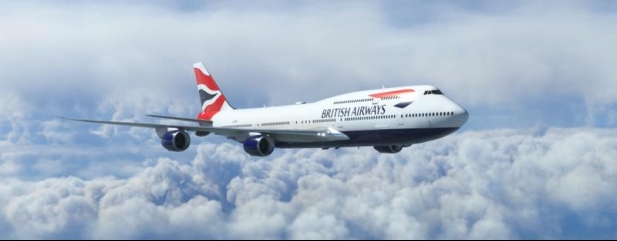Archived article
Please note that tax, investment, pension and ISA rules can change and the information and any views contained in this article may now be inaccurate.
Why British Airways owner International Consolidated Airlines is worth buying

International Consolidated Airlines (IAG) 162p
Market cap: £7.98 billion
Unloved by investors during the pandemic British Airways owner International Consolidated Airlines (IAG) has experienced a revival of fortunes due to strong consumer demand and holidaymakers paying higher ticket prices. Despite the ongoing cost-of-living crisis – people are still prioritising holidays.
In a recent full year trading update at the end of February, the airline group said it had restored 95.7% of 2019 capacity.
Passenger unit revenue for the year was 8.2% higher than in 2022 ‘with strong leisure traffic recovery and business traffic recovering more slowly’ although the premium leisure segment continued to perform ‘very well’.
Operating profits nearly tripled from €1.3 billion to €3.5 billion surpassing the previous record of €3.3 billion made by the company pre-pandemic in 2019.
The group, which also owns Spain’s Iberia and Ireland’s Aer Lingus, has a positive outlook for 2024 and is generating significant free cash flow.
We don’t think this improving picture is reflected in an extremely grudging price to earnings ratio of just 4.5 times based on 2024 consensus forecasts.
IMPROVING SENTIMENT
The airline group is at least getting a more sympathetic hearing from the analyst community. Analyst James Hollins from French investment bank BNP Paribas recently observed the company had: ‘Fixed our bear thesis; leverage is down. British Airways is improving, Iberia is at record strength, shareholder returns are resuming, Heathrow is full again and core wage deals are fixed mid-term.’
Savi Syth, analyst at US investment bank, Raymond James highlights: ‘IAG’s greater exposure to favourable trends in the transatlantic and intra-European markets, improving competitive capacity set up, and opportunity to initiate cash returns to shareholders.’
The company has adapted to and acknowledged the post-pandemic realities of flying in Europe grabbing a high share of transatlantic traffic and offering premium leisure travel to consumers.
It is making improvements to its service which could help it maintain and grow its market share. There is planned investment in areas including a digital concierge service, WhatsApp text assistant and call-centre Smart Voice assistant.
There will also be touchpoints across the airport journey, better digital self-service in disruption and digital assistance in the customer care channel.
British Airways customers will benefit from increased in-flight entertainment and a premium proposition across its cabins. The airline is also going to further develop its call centre in Delhi using better IT and systems and an initiative-taking care team.
WORST IS OVER
Analyst Nicholas Mauder of Kepler Cheuvreux no longer believes the airline operator will see a passenger yield decline this year. Passenger yield is an important metric for the airline sector – it shows the average fare paid per mile or kilometre, per passenger.
Mauder has significantly increased his EBIT (earnings before interest and taxation) estimate for 2024 to €3.74 billion.
Mauder says the company has the cleanest unit cost outlook among its counterparts. He adds: ‘Our (significantly increased) estimates are above consensus, and an eventual share buyback could be the catalyst the market needs to acknowledge the value we see in IAG shares.’
FUEL COST WORRIES
The main sticking points for the company are slower than expected recovery of business travel and ongoing volatility in the cost of fuel.
In the recent annual results, the company noted fuel unit costs were up 0.7% versus 2022, however the group’s investment in more fuel-efficient aircraft should help offset increased costs of emissions trading schemes.
The airline is 92% booked for the first quarter of 2024 and 62% booked for the first half of 2024, ahead of last year on both measures.
The company plans to grow capacity by around 7% in 2024 and rebuild its pre-pandemic long haul capacity and grow Iberia in the attractive Latin American market.
Important information:
These articles are provided by Shares magazine which is published by AJ Bell Media, a part of AJ Bell. Shares is not written by AJ Bell.
Shares is provided for your general information and use and is not a personal recommendation to invest. It is not intended to be relied upon by you in making or not making any investment decisions. The investments referred to in these articles will not be suitable for all investors. If in doubt please seek appropriate independent financial advice.
Investors acting on the information in these articles do so at their own risk and AJ Bell Media and its staff do not accept liability for losses suffered by investors as a result of their investment decisions.
Issue contents
Ask Rachel
Daniel Coatsworth
Editor's View
Feature
- Why the Taiwanese market is more than just TSMC
- Emerging markets: semiconductor surge, electric vehicles and Egypt
- Small world: a look at some of the month’s interesting small-cap stories
- Sweet like chocolate: the total return stocks profiting from the sale of tasty treats
- Invest in fantasy: The power of imagined worlds and the ways to play them
Great Ideas
News
- Activist investor buys into Scottish Mortgage as buyback is announced
- Next shares reach new all-time high as earnings top estimates
- Dowlais shares skid to record low on bumper provision
- Markets move higher on more ‘dovish’ central bank comments
- Why Apple US antitrust probe has spooked investors
- Gold and stocks scale new heights after dovish Fed meeting
 magazine
magazine








